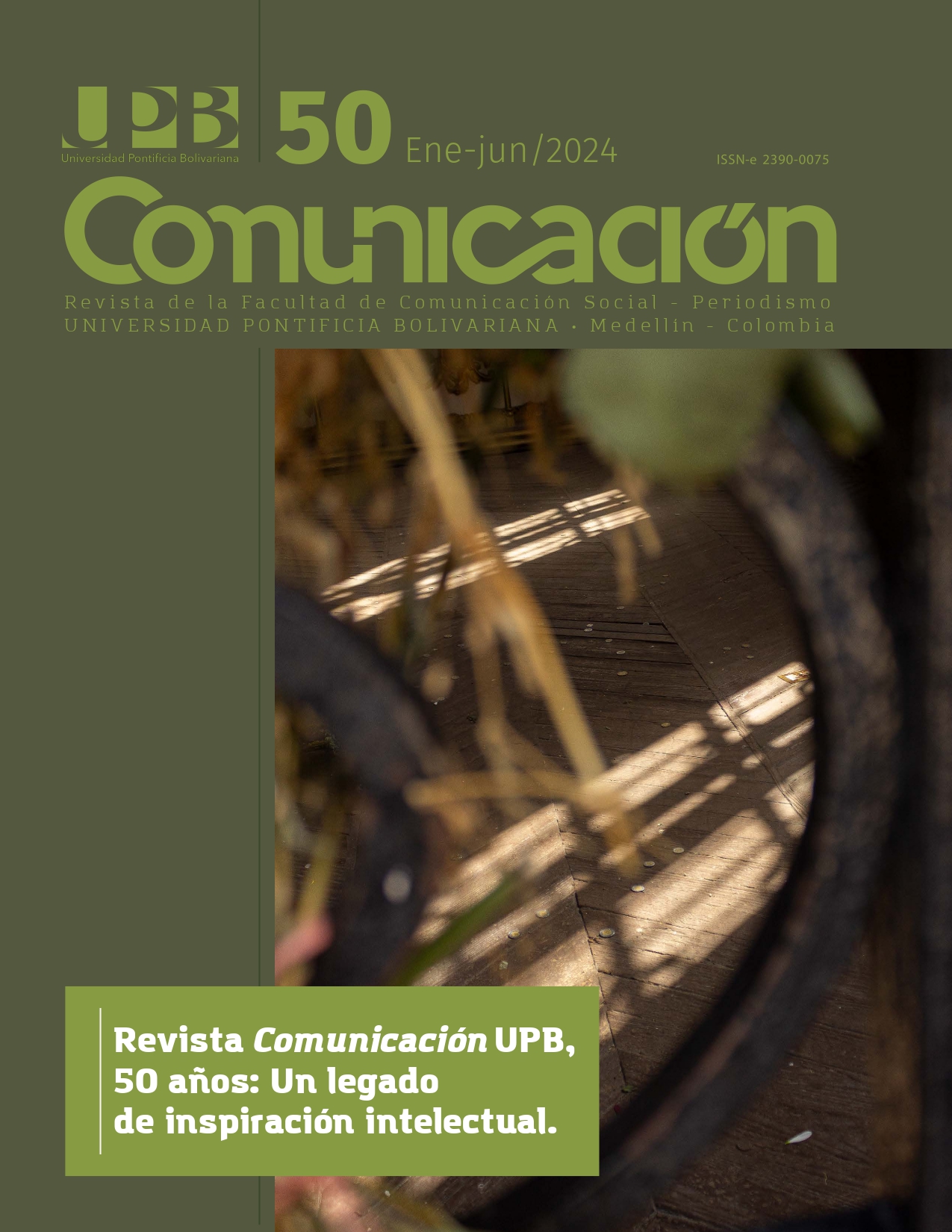Risk perception and information in times of pandemic: the memory of a connected confinement in young people from Bucaramanga
Main Article Content
Abstract
In the midst of a pandemic context, the year 2020 left the world population vulnerable to the risk of a disease caused by a virus and tested the ability to comply with prevention measures, such as social isolation. This article reports the results of an investigation that sought to gather testimonies about the fear of COVID-19 among university students in Bucaramanga (Colombia), based on their recollection of what happened in the year 2020. Using a qualitative approach, semi-structured interviews were employed as a methodological strategy in order to generate narratives based on recollection, associated with three categories of analysis: perception of risk, information consumption as an influencing factor, and compliance with social distancing measures. The results lead to the conclusion that there was a high perception of risk, mainly influenced by parents and grandparents as familial authorities, and reinforced by a dynamic of increasing and immediate information about contagion and the disease caused by the SARS-CoV virus. The dynamics of distributed and immediate communication on the subject promoted a progressive closeness to the disease, becoming an enhancing factor of risk perception. The recollection allows for the depiction of an environment of physical confinement with a return to traditional practices of family exposure to stories and narratives of the pandemic presented through television, within the context of young individuals cohabiting with multiple generations.
References
Alonso, L. E., y Benito, L. E. A. (1998). La mirada cualitativa en sociología: una aproximación interpretativa, vol. 218. Editorial Fundamentos.
Baiz Quintana, J. y Morales Calatayud, F. (2021). Enfoque psicosocial de la percepción del riesgo en prácticas sexuales de la población estudiantil universitaria. Revista IT Salud Comunitaria y Sociedad, 8(8), pp. 4-19. https://apex.edu.uy/wp-content/ uploads/2021/12/revista-IT-web.pdf#page=5
Briceño, Y. (2014). Comprendiendo el modo emergente de la comunicación. Revista Cuestiones Universitarias, 4(4), pp. 92-104. https://www.researchgate.net/profile/ Ysabel-Briceno/publication/329374444_Comprendiendo_el_modo_emergente_de_la_ comunicacion/links/5c0566f7a6fdcc315f9acb87/Comprendiendo-el-modo-emergentede- la-comunicacion.pdf
Casero-Ripoll.s, A. (2020). Impact of Covid-19 on the media system. Communicative and democratic consequences of news consumption during the outbreak. El profesional de la información, 29(2), pp. xx-xx. https://doi.org/10.3145/epi.2020.mar.23
Cerezo Prieto, M. (2020). Sesgos cognitivos en la comunicación y prevención de la COVID-19. Revista Latina de Comunicación Social, 78, pp. 419-435. https://nuevaepoca.revistalatinacs.org/index.php/revista/article/view/225
Chadwick, A. (2017). The hybrid media system: Politics and power. Oxford: Oxford University Press.
Donovan, J. (2020). Concrete Recommendations for Cutting Through Misinformation During the COVID-19 Pandemic. American Journal of Public Health 110(S3), pp. S286-S287.
El País (2021, abril 11). “Autoridades suspendieron fiesta con más de 200 personas en El Guabal, sur de Cali” [Comunicado de prensa]. https://cutt.ly/YEoncF5
France24 (2020, agosto 26). “Los jóvenes son los ‘principales impulsores’ del COVID-19 en América Latina [Comunicado de prensa]. https://cutt.ly/QEobsRN
Fuchs, C. (2021). Everyday life and everyday communication in coronavirus capitalism. Communicating COVID-19 (pp. 17-61). Emerald Publishing Limited. García del Castillo, J. A. (2012). Editorial.
Concept of risk perception and impact on addictions / Concepto de percepción de riesgo y su repercusión en las adicciones. Health and Addictions/Salud y Drogas, Vol. 12 Núm 2, pp. 133-151. https://doi.org/10.21134/haaj.v12i2.2
García-Marín, D. (2020). Infodemia global. Desordenes informativos, narrativas fake y fact-checking en la crisis de la Covid-19. Profesional de la información, 29(4), pp. xx-xx. https://revista.profesionaldelainformacion.com/index.php/EPI/article/view/79503
Guerrero-Velázquez, C. A. (2021). Memoria y percepción en la entrevista autobiográfica: una simulación episódica que se adapta en tiempo real al contexto. Estudios de Filosofía. 64, pp. 21-45. https://www.redalyc.org/journal/3798/379868849002/html/
Igartúa, J-J, Ortega-Mohedano, F., Arcila-Calderón, C. (2020). Communication use in the times of the coronavirus. A cross-cultural study. El Profesional de la Información, 29, pp. xx-xx. https://doi.org/10.3145/epi.2020.may.18
Martín Alfonso, L., Martínez, L., Cancio-Bello, C., Rodríguez, M., Ortiz, J. (2020). Percepción de riesgo, búsqueda de ayuda médica y autocuidado: retos psicológicos frente a la covid-19. Revista cubana de psicología, 2(2), pp. xx-xx. https://revistas.uh.cu/psicocuba/article/view/229
Medical News Today (2020, 14 abril). “Causas del coronavirus: Su origen y cómo se propaga” [Comunicado de prensa]. https://www.medicalnewstoday.com/articles/es/causas-delcoronavirus- su-origen-y-como-se-propaga#transmision
MinTIC Colombia. (2020). “As. funciona CoronApp Colombia, aplicaci.n para detectar y monitorear casos de covid-19” [Comunicado de prensa]. https://mintic.gov.co/portal/ inicio/Sala-de-prensa/MinTIC-en-los-medios/135648:Asi-funciona-CoronApp-Colombiaaplicacion- para-detectar-y-monitorear-casos-de-covid-19
Montaña Blasco, M.; Ollé Castell., C. y Lavilla Raso, M. (2020). Impacto de la pandemia de Covid-19 en el consumo de medios en España. Revista Latina de Comunicación Social, 78, pp. 155-167. https://www.doi.org/10.4185/RLCS-2020-1472
Navarro, H. (2020). Cómo es la información que recibimos sobre la COVID-19. Estudio de percepción y consumo. Chasqui. Revista Latinoamericana de Comunicación, 145, pp. 67- 92.
Organización de las Naciones Unidas. (2020, octubre 10). “El COVID-19 infecta cada vez más a los niños y jóvenes de América” [Comunicado de prensa]. https://news.un.org/es/story/2020/10/1482002
Román, G., Álvarez-Rementería, M., Pérez-Izaguirre, E. y Dosil, M. (2020). El papel de los Medios de Comunicación en Situaciones de Crisis Sanitaria. La Percepción de la Población en torno al Control y las Normas Sociales durante la Pandemia del COVID-19. Revista Latina de Comunicación Social, 78, pp. 437-456. https://www.doi.org/10.4185/RLCS-2020-1484
Torralbas Oslé, J y otros (2020). Identidad nacional y percepción de riesgo ante la COVID-19 en jóvenes cubanos. Revista Cubana de Psicología, 2(2), pp. 27-40 . https://acortar.link/4LpNWv https://www.researchgate.net/publication/344800523_Identidad_nacional_y_ percepcion_de_riesgo_COVID19
Unión Internacional de Telecomunicaciones. (2021, noviembre 30) “2900 millones de personas siguen careciendo de conexión” [Comunicado de prensa]. https://www.itu.int/es/mediacentre/Pages/PR-2021-11-29-FactsFigures.aspx
Urzúa, A., Vera-Villarroel, P., Caqueo-Urízar, A., y Polanco-Carrasco, R. (2020). La psicología en la prevención y manejo del COVID-19. Aportes desde la evidencia inicial. Terapia psicológica, 38(1), pp. 103-118. https://dx.doi.org/10.4067/S0718-48082020000100103
Vanguardia (2021, marzo 10). “Irresponsabilidad de los jóvenes disparará los casos de Covid-19 en Santander” [Comunicado de prensa]. https://cutt.ly/uEobwFP
World Health Organization. (2020, 7 agosto). “WHO: Partying young people risk spreading coronavirus” [Comunicado de prensa]. https://www.weforum.org/agenda/2020/08/ coronavirus-covid-19-who-youth-young-party-pandemic/






